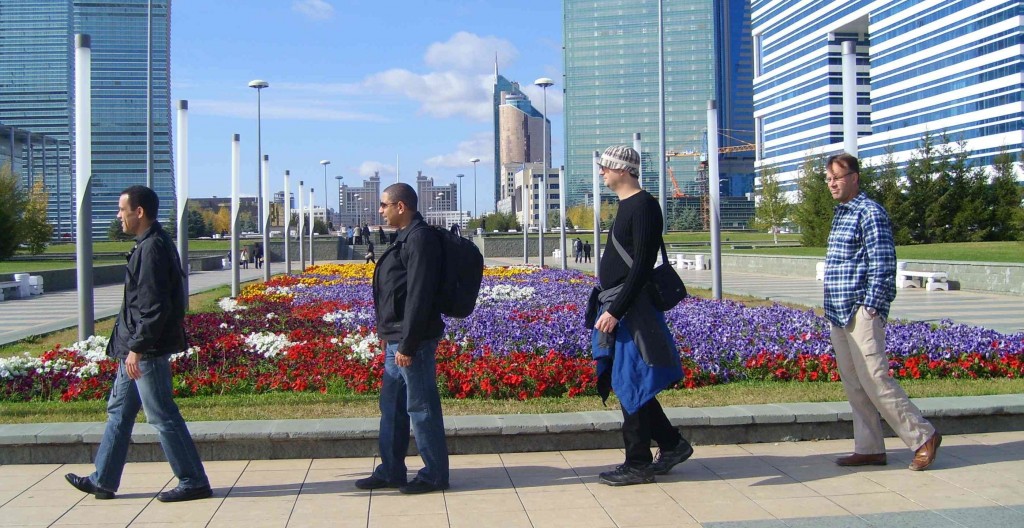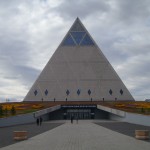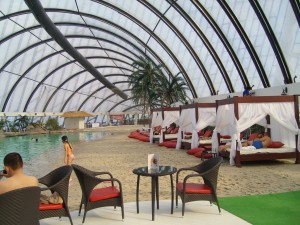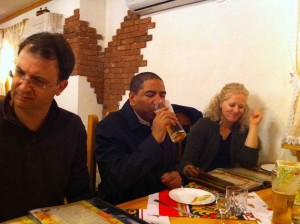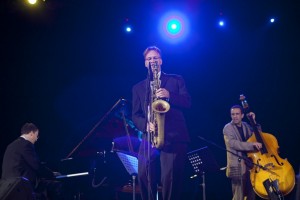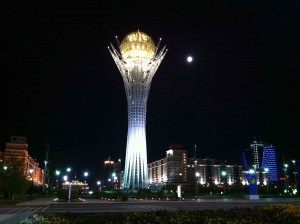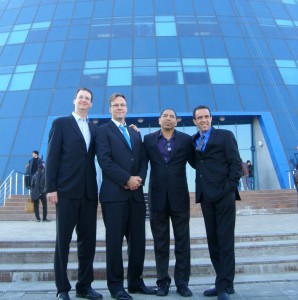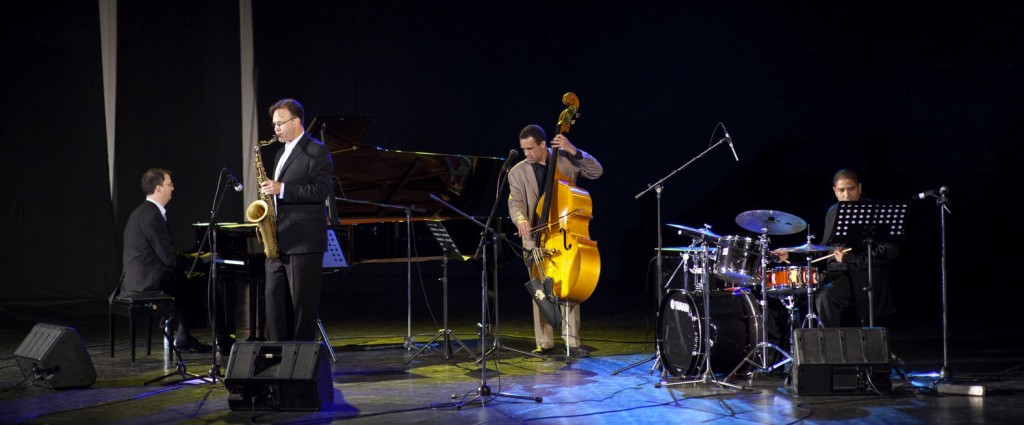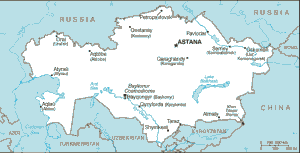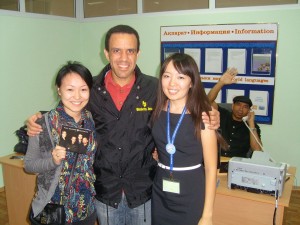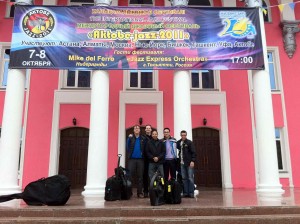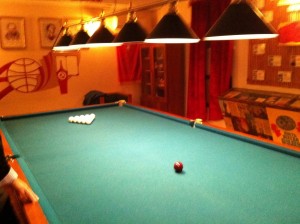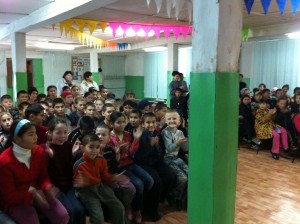Our first rest day of the tour. We’ve heard that there’s an indoor beach with a waterslide at a shopping mall in Astana, Khan Shatyr, the biggest mall in Central Asia. I recall doing a Middle East Rhythm Road tour with Alvin Atkinson and The Sound Merchants in 2007 where we visited Dubai and saw the ski slope, Ski Dubai, in the Mall of the Emirates. I can’t miss the opportunity to see a beach in a mall, that will be a first. We start our journey by walking along the central strip in Astana that
starts with the Pyramid of Peace (also known as the Palace of Peace and Reconciliation) and continues through the capital building, the Bayterek Tower, and the Khan Shatyr mall on the other end. The whole strip is 3 miles long. We’ll only walk half then take a cab later to the Pyramid. The buildings along the way are incredible, almost everything in Astana is new as the capital was moved here from Almaty in 2005. Since then the government has been building Astana quite a bit and in 10 years many of the building and architecture projects will be finished. If Astana looks this way now I can only imagine what it will be like when it’s finished. As a country Kazakhstan is only 20 years old having declared their independence from the USSR in 1991. Everything is so modern-looking now in Astana it’s amazing that this is a post-Soviet territory.
The mall is overwhelming and incredible. We grab a bite and some coffee and head for the ‘beach’. Unbelievable. The beach and waterside are six tall stories from the ground and this definitely looks like a futuristic movie. Well done. We exit to catch a cab to the Pyramid of Peace which is another landmark of the city. Unfortunately the Pyramid is closed on Sundays but there’s still plenty of pictures to take outside and on the way back the hotel passing the capital and the Bayterek Tower along the way. Back to work gentlemen – 4 more days in Kazakhstan before we leave for Kyrgyzstan.
At 9am we head out to do a workshop for music students at an international school. We’ve brought much of our own equipment so this time we’re in a large classroom where Bennett can play keyboard and Tony can sing through a small amp I have with me. We play a song up front and start talking about jazz and the different instruments. We get the students involved in some small group and large group improvisation exercises and have everyone clapping and singing. We answer questions afterward and play another song. I’m glad after the workshop the students have a much better understanding of what we’re doing than they did when we first started. After the closing applause, several pictures and autographs we’re ready for some lunch. We’re joined by Jeff Sexton along with Maren and Zhanar for a great discussion about music over our meal. We cover Jazz and Classical music’s standing in America and how that relates to audiences worldwide. We talk about some of America’s pop greats like Stevie Wonder, Michael Jackson, Paul Simon, and others yet how much the younger generation tends to gravitate toward music that’s visually-based. I’m concerned about the future of music as it’s become much more about sight than sound. We’re well aware of the artist’s responsibility to captivate the interest of the audience yet leave something of artistic value to uplift the spirit and leave behind a legacy for the next generation to aspire to not just in terms of popularity but in terms of art. After a great conversation that we pledge to continue it’s time to go back to the hotel and pack up for another plane flight. That early evening we fly to Pavlodar for another American Corner event and concert again accompanied by Maren and Zhanar.
We arrive in Pavlodar, check in to the hotel and eat at a Russian restaurant to get some more tastes of the local food and specialities. Pavlodar is another major city in Kazakhstan and we can get a sense that like Aktobe it has a more established and continuous history than Astana. Astana has been largely rebuilt since the government decided to move the capitol there from Almaty so much of Astana is new. Here we can see Soviet architecture and a mixture of the Kazakh nomadic tradition, Russian tradition and a more modern influence since their independence all mixed together.
The next morning we do another American Corner event meeting new people, answering more questions, and again talking about what we do and playing some music which at times engages the audience. There is another press conference afterward with a few newspapers. I notice that with every question and answer session sometimes by answering it helps me clarify what I’m doing and what we’re doing as a band. I’ve always been into the concept of making music that has a high degree of authenticity and originality. I come to realize that my career has followed that direction all along. From insisting on learning classical and jazz music, playing in the Black Church, playing blues, funk, R & B, studying with some great Latin jazz players, and amassing a huge library of music at home. I explain that in the Pathways band I try not to distinguish between the different musical styles all styles are equally valid forms to improvise on but we are using the jazz philosophy as we approach every song. Jazz philosophy meaning we are improvising on the melody or the song, the harmony and sometimes also the form. As we are playing each song the band is actively listening to each other. We’re in conversation with each other and with the audience as we feed off the audience’s reaction as well. Stylistically we may stay in the blues, a certain Latin style or funk but the jazz element is the spontaneous composition that takes place as we perform the piece. I also like being inspired by folk music and other great songs. I love the jazz standards but I see that as only one source of songs and there’s a whole world of music out there. Pathways has continued to learn a new song in every country that we’ve visited and added that to the band’s repertoire. Much of the band’s repertoire at this point is folk or pop songs from different countries throughout the world. Trying to keep the original rhythmic feels authentic to the home country and styles the songs are from I realize Pathways is moving into a direction of world music using a jazz concept. We perform our arrangement of the Kazakh folk song ‘Kamazhai’ again for the American Corner audience to illustrate our message of keeping the music authentic and yet adding an additional level of creativity to it. People at event really like what we play but are particularly interested in our arrangement of ‘Kamazhai’.
We have lunch, a soundcheck, and get ready for our first full-length concert of the tour. Our show in Aktobe was only 30 minutes to kick off the International Aktobe Jazz Festival and while that was fun we do appreciate having a full 90-minute show ahead of us. Our performance in Pavlodar is electric. Something happens musically that really brings this band together on this show and we play better than we ever have before. I’m sure the audience may have something to do with it as there are over 800 people in attendance. This is our first overseas full concert since October 2010 in Honduras and our first live showcase of some of the music we recorded for the ‘Americas’ CD in May. Whatever it is we feel great and the audience goes nuts. Again ‘Kamazhai’ is a big hit along with ‘Maria’ that we learned in Suriname and ‘Nicaragua Nicaraguita’ that we learned in Nicaragua. We feel like rock stars from our audience’s reception after the show. It’s great to play jazz and get that kind of feedback. It inspires me that musically the band is on the right path.
7:30am lobby call the next day to fly back to Astana. We have another big show tonight this time in Astana at Shabyt, the National Academy of the Arts. I have a few press interviews in the afternoon before the band heads out to soundcheck. There is a nuclear proliferation conference in Astana going on at the moment and there are diplomats from all over the world in attendance. Kazakhstan has been a leader in nuclear proliferation and this is an international conference to discuss future plans. Our concert turns out to be not only for the general public but also for the international delegates of the conference. We are honored to be playing a part of such an important event. The concert (video clip of “Caravan”) is well-attended by over 500 people with standing and sitting room only as the hall is packed. I’m happy that our energy from Pavlodar carried over and continued in another great show featuring our interpretation music from all over the world. People feel like they are being treated to a smorgasbord of great sound. I guess growing up in diverse San Francisco I like it that way. Again much applause, photographs, conversation and autographs afterward. I’m especially touched by those we meet who work to foster a sense of cultural understanding and diversity and to those aspiring musicians that we’ll be working with the next day during our workshop during our master class. It’s been a great night.
Our last day in Kazakhstan and we’re back at the National Academy of the Arts (Shabyt) this time to teach the students. Many of the students saw our performance the night before but not everyone. We play some music up front and this time we can get more in depth about music then many of our other workshops because today we have college students and aspiring professionals. We get the opportunity here to teach and invite students to play with us and give them some constructive criticism. The students here are talented and eager to play as well as eager to learn. Improving in a skill involves not just practice and developing new habits but unlearning certain habits as well. A real transformation can take place when a student unlearns an old habit and replaces it with a new, more constructive one. It’s always a joy to witness that transformation take place during the course of one master class. We leave them with as much encouragement and advice as possible and the students and teachers are very thankful. Hopefully this is a place we can return to as there is much learning that took place during this 90 minute short period of time. We have a photo session and conversation afterward with autographs and hope to come back in the future.
This has been a nice end to our Kazakhstan part of the tour. We will miss Maren and Zhanar who have been with us since we arrived in Kazakhstan. We do get a chance to be in Almaty but only the airport as a two-hour layover before taking another plane to Bishkek, Kyrgyzstan where another set of experiences await us. We will have fond memories of Kazakhstan in terms of the people, the culture, our interaction and the concerts we played there. It feels like we’re starting this tour on a real high note. Our next move is to learn some music from Kyrgyzstan. We have a big concert the first day of our arrival and we will play an arrangement of a Kyrgyz folk song on that show. In the meantime we’re going to enjoy our two hours in Almaty as our last stop in Kazakhstan by having some traditional Kazakh food at the airport. It’s surprisingly good. Now for our next flight.
